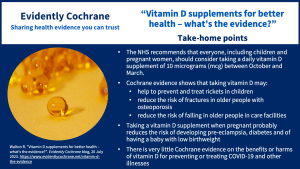In this blog for people thinking of taking a vitamin D supplement, Robert Walton, a GP and Senior Fellow in General Practice at Cochrane UK, shares NHS recommendations and looks at the latest Cochrane evidenceCochrane Reviews are systematic reviews. In systematic reviews we search for and summarize studies that answer a specific research question (e.g. is paracetamol effective and safe for treating back pain?). The studies are identified, assessed, and summarized by using a systematic and predefined approach. They inform recommendations for healthcare and research. on vitamin D to help you make a choice about whether to take vitamin D supplements.
Blog last updated: 04 October 2023.
Take home points

Health problems where Cochrane evidence suggests there may be some benefit from taking vitamin D
Bone health: rickets in children
NHS guidance is that all children over the age of one should take a 10 micrograms (mcg) vitamin D supplement to prevent rickets, as well as having a healthy balanced diet and spending some time out in the sun. The NHS also advises that babies from birth to 1 year need 8.5 to 10mcg of vitamin D a day, unless they have 500ml or more of infant formula a day.
Rickets is a disease caused by inadequate levels of vitamin D normally produced from the action of sunlight on the skin. The riskA way of expressing the chance of an event taking place, expressed as the number of events divided by the total number of observations or people. It can be stated as ‘the chance of falling were one in four’ (1/4 = 25%). This measure is good no matter the incidence of events i.e. common or infrequent. of vitamin D deficiency is increased with dark-coloured skin and lack of sunlight exposure which may either be for religious or cultural reasons or from a desire to reduce chances of developing skin cancer. Lack of calcium in the diet also contributes to the disease, as may substances in food which prevent absorption of calcium. Children in families that avoid milk and eat unleavened flatbreads may be at particular risk. The disease affects the growth of bones in young children and may lead to fractures and severe deformities in later life if untreated.
Once a result of the industrial smog shrouding Britain’s big cities, rickets is now making a comeback with the number of children affected increasing year on year. It’s interesting to see the Dickensian diseases returning to the same areas of cities, such as the East End of London, where they caused so many problems in the Victorian era. The smog that cut out the sun is long gone, but now as then, rickets goes hand in hand with poverty and malnutrition.
In the United Kingdom, the sunlight may be strong enough to produce sufficient vitamin D from May to August, given sufficient skin exposure, although children and adults who spend little time outdoors may decide to use supplements all year round. Vitamin D dissolves in fat and is easily absorbed through the gut. Some foods such as oily fish and egg yolks have reasonably high vitamin D content, but to get 10mcg a day you would need to eat an extra half a dozen eggs or two tins of sardines. This would be quite an ask for most people, hence the NHS advice on the use of supplements.
Returning to rickets, the good news is that even when rickets has developed, bones may be healed by adjustment of the diet and treatment with vitamin D, calcium or both.
Bone health: osteoporosis
In older adults with osteoporosis, vitamin D taken with calcium gives a small reduction in the risk of bone fracture. However, there is probably little or no increase in bone density from taking vitamin D supplements for women before the menopause.
People who need to take steroid medication are at much greater risk of osteoporosis at any age and may also benefit to an extent from taking vitamin D and calcium. A Cochrane ReviewCochrane Reviews are systematic reviews. In systematic reviews we search for and summarize studies that answer a specific research question (e.g. is paracetamol effective and safe for treating back pain?). The studies are identified, assessed, and summarized by using a systematic and predefined approach. They inform recommendations for healthcare and research. showed that vitamin D and calcium may prevent the bone loss which can happen when taking steroid medication. Whilst common medical practice now is to offer people new bisphosphonate drugs which may give greater bone protection, taking vitamin D and calcium may be an option for people who can’t take bisphosphonates because of side effects.
Pregnancy
I admit to being a little surprised a few years ago when firm advice was published saying that women should take vitamin D when pregnant in addition to folic acid. My experience as a GP suggests that women can be very reluctant to take any kind of medication when pregnant. I myself and probably many other doctors share their concerns. As a result of these worries the advice to take vitamin D supplements may not have been universally followed.
But the Cochrane evidence to back up the NHS advice is pretty clear. Taking a vitamin D supplement when pregnant probably reduces the risk of developing pre-eclampsia, diabetes and having a baby with low birthweight. Although these complications are relatively uncommon, occurring perhaps in around 2% of pregnancies, these illnesses cause very serious health problems for mother and child which may easily be avoided:
- pre-eclampsia (a condition that affects some pregnant women, usually during the second half of pregnancy or soon after their baby is delivered) is an important cause of death in pregnancy
- gestational diabetes leads to problems in labour and increases the risk of complications for the child
- low birthweight increases the risk of death and leads to problems with child development
Current NHS recommendations suggest that pregnant women take 10mcg (400 international units) a day and, in keeping with the evidence on other vitamin supplements, a Cochrane Review suggests that taking higher doses than this doesn’t bring much in the way of additional benefits.
Reassuringly, even in the trialsClinical trials are research studies involving people who use healthcare services. They often compare a new or different treatment with the best treatment currently available. This is to test whether the new or different treatment is safe, effective and any better than what is currently used. No matter how promising a new treatment may appear during tests in a laboratory, it must go through clinical trials before its benefits and risks can really be known. that used high doses of vitamin D, there was no evidence of increased risk of side effects from taking supplements. Find out more in this blog: Vitamin D supplements in pregnancy: what’s the latest evidence?
Falls
Falling is a major cause of health problems in older people, particularly those living in care facilities. Vitamin D supplementation may play a part in preventing falls and their complications such as bone fractures.
A Cochrane Review found that the rate of falls among older people in care facilities was probably reduced by about a quarter in those taking vitamin D supplements. To put this in context people in these studies who were at low risk fell about once a year and those at high risk were falling three or more times a year. So the risk may be quite high and the consequences are very serious in terms of hip fractures and other injuries. It’s not clear how vitamin D might work to prevent falls, but it may be that it helps muscles to work properly. Many of the people in the trials included in this part of the review were vitamin D deficient so it is possible that only people with low vitamin D levels will experience benefit from taking supplements.
When may taking a vitamin D supplement not be worthwhile?
Childhood pneumonia
Some studies show an associationA relationship between two characteristics, such that as one changes, the other changes in a predictable way. For example, statistics demonstrate that there is an association between smoking and lung cancer. In a positive association, one quantity increases as the other one increases (as with smoking and lung cancer). In a negative association, an increase in one quantity corresponds to a decrease in the other. Association does not necessarily mean that one thing causes the other. between vitamin D deficiency and developing chest infections – so might having a supplement of vitamin D help in treating pneumonia in children if they are unfortunate enough to get it? ‘Probably not’ is the short answer.
Growth in children
It’s interesting that whilst there is a link between low vitamin D levels and poor growth in children, there may be little or no improvement in growth when children are taking additional vitamin D.
Asthma
A Cochrane Review Vitamin D for the management of asthma shows that taking a vitamin D supplement does not reduce the risk of asthma attacks. Read more in this blog: Vitamin D for asthma: new evidence, new message.
Illnesses and diseases where there is a lack of evidence about whether taking vitamin D supplements helps to prevent or treat illness
COVID-19
There are many theoretical reasons why vitamin D might help with a wide range of diseases, COVID-19 being one of them. In addition to keeping bones strong, vitamin D helps the immune system to work properly, and overactivity of the immune system causes many complications of COVID infection, increasing the number of people who died during the COVID pandemic. But perhaps surprisingly there’s very little evidence on whether taking additional vitamin D helps you to avoid COVID complications.
So whilst it seems sensible to follow the general recommendation for everyone in the UK to consider taking a low-dose (10 mcg) vitamin D supplement between October and March, there’s no evidence to suggest that this will prevent Covid complications.
Other conditions where there is uncertainty about the effects of vitamin D
Given its wide range of potentially beneficial effects, it is not surprising that many studies have examined the effects of vitamin D supplementation for a wide variety of different diseases. But it’s still uncertain whether there is any benefit or harm in taking vitamin D for:
- treating inflammatory bowel disease (a life-long disease affecting the gut)
- treating chronic liver disease
- managing sickle cell disease
- reducing the risk of breast cancer
- managing hypoparathyroidism (a common complication after thyroid surgery)
- preventing bone problems after radiotherapy
- preventing relapse or disability in people with multiple sclerosis (despite many studies linking low levels of vitamin D to problems with multiple sclerosis).
So who should consider taking vitamin D supplements?
Cochrane evidence backs up the NHS recommendation that children and adults should consider taking a 10mcg vitamin D supplement between October and March, to keep bones, teeth and muscles healthy. And the same supplement can help women to stay healthy during pregnancy and have healthy babies. Avoiding vitamin D deficiency by taking a supplement probably gives a substantial reduction in the risk of falls in older adults living in care facilities. But for the rest of the illnesses studied, there isn’t enough evidence on the benefits and harms of getting your sunshine from a bottle.
You can join in the conversation on Twitter with @CochraneUK @rtwalton123 or leave a comment on the blog.
Please note, we cannot give specific medical advice and do not publish comments that link to individual pages requesting donations or to commercial sites, or appear to endorse commercial products. We welcome diverse views and encourage discussion but we ask that comments are respectful and reserve the right to not publish any we consider offensive. Cochrane UK does not fact-check – or endorse – readers’ comments, including any treatments mentioned.



[…] A Cochrane post from 2023 outlined three groups of people where there’s enough evidence to support supplementing with vitamin D: […]
The dosage recommendations of “studies” by manufacturers tend to suggest daily intake at 4-10 times the necessary amount.